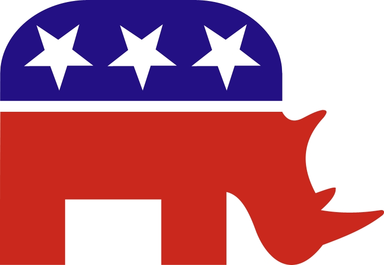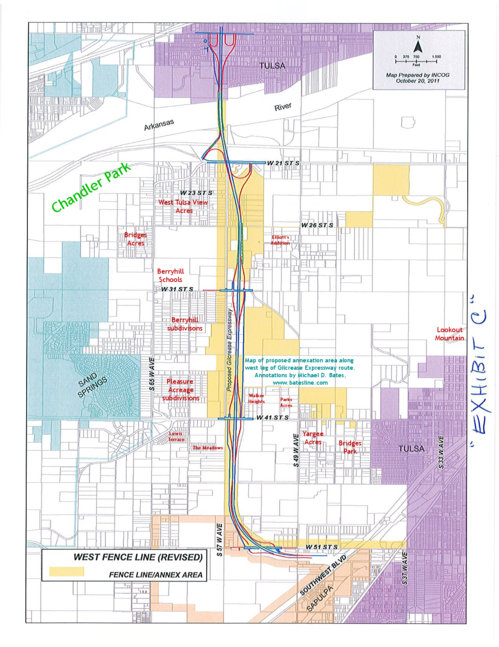Tulsa City Hall: November 2011 Archives
The Tulsa Metropolitan Utility Authority (TMUA), which operates the City of Tulsa's water system, will vote today whether to approve a contract for $925,600 with Crossland Heavy Contractors for "Chloramines Modifications" at Tulsa's two water treatment plants, A. B. Jewell and Mohawk.
The meeting will be held at 2:30 p.m., Wednesday, November 16, 2011, in Conference Room 10 South.
If you're concerned, as many are, about the health effects of chloramine in our drinking water, this meeting might be a good opportunity to express those concerns to the people entrusted with the stewardship of our water system.
MORE: The Tulsa City Council Urban and Economic Development Committee Meeting dealt briefly with the chloramine issue on Tuesday, at the request of Councilor Jim Mautino, who asked questions of city public works employee Clayton Edwards. The 20-minute video of the meeting begins at 10 minutes into the clip at this link.
The video includes an excerpt of TMUA vice chairman Rick Hudson at the October 27, 2011, City Council meeting, defending the choice of chloramine as a water disinfectant and informing the City Council that the TMUA has the final decision over the use of chloramine. Hudson said on October 27 that he'd be glad to have chloramine expert Bob Bowcock, a member of the American Water Works Association, at the next meeting.
You can watch the full October 27, 2011, City Council agenda item about chloramine here, including Bob Bowcock's presentation and comments from Hudson. The agenda item starts at 1:30:00.
At Tuesday's committee meeting, city director of environmental services Clayton Edwards said that Bowcock will be on TMUA's December 14 agenda. The TMUA board could opt, Edwards said, to delay the contract award until they hear from Bowcock, but once approved it would be binding.
Mautino noted an interesting article on the website of RL Hudson -- TMUA vice chairman Rick Hudson is the president and CEO of the company -- about the effects of chloramines in our water supply:
So how do chloramines affect the seals and other elastomeric parts within the water distribution chain? With anecdotal evidence suggesting that chloramines hasten elastomer failure in devices ranging from toilets to faucets to fire sprinklers, the American Water Works Association Research Foundation (AWWARF) conducted a study. The results indicate that chloramines do indeed pose a significant threat to many of the most widely used elastomeric materials, including natural and synthetic isoprenes, styrene butadiene (SBR), chloroprene (CR), and nitrile (NBR).In side-by-side tests with chlorine, chloramines caused more material swell, deeper and denser cracking, faster loss of elasticity, and greater loss of tensile strength. In a susceptible material, chloramines appear to attack the polymer's cross-links, the connections that give the material a resilient, three-dimensional structure. Cracks develop and water flows in, swelling the material and resulting in a marked loss of other physical properties. Degradation becomes more pronounced as temperatures increase.
How to cope with this chemical that degrades the rubber and plastic parts in our plumbing systems? RL Hudson has a solution: "If your application requires it, we at RL Hudson can help you find compounds that will withstand chloramines."
Toward the end of the exchange between Mautino and Edwards, there's a discussion of elevated lead levels in the blood in Washington, D. C., related to the use of chloramines in their drinking water. Edwards acknowledged that that had been a problem but thought that Washington had taken steps to mitigate it.
It's evident that Councilor Mautino has done his homework on this issue. Tulsans should be grateful that Mautino is willing to continue to delve into this issue, despite being a lame duck since his defeat in September's primary. You may not miss him now, but you will in a few months.
A weird election season has come to an end. Tulsa voters have emptied out the City Council and turned down two radical plans to remake city government (while embracing two ill-considered modifications with bigger impact than voters appreciate).
After the polls closed, I collected results from precincts along the southern tier of District 4. Of the seven locations I personally checked, Ken Brune won only two -- 65 and 156 -- precincts in the heart of the Money Belt that pushed him over the top in the primary, but he won only by slim margins. It was apparent that Republican Blake Ewing would win by a handsome margin. I headed to the historic Church Studio at 3rd Street and Trenton Ave. for Blake Ewing's watch party.
During his victory speech Ewing explained why he chose the venue for his victory party:
"I chose to have it here, because this is one of those hidden gems in Tulsa. This place sat mostly empty for a very long time." He drew an analogy between the studio and Tulsa itself. "It's had this great, beautiful history, and then somewhere along the way it may have lost its way in some places. And the effort of creative, energetic people brought something special back to life again.... I appreciate what the Miller family has done with the Church, and I hope that on a much grander scale we can do that with our city, that we can see its potential and choose to raise the bar across the board, and that as a community we will work towards that together."
Blake surprised me with a very gracious shout-out for my work here at BatesLine during this election season. I found it especially touching because he gets why I do what I do, and one of the things I most appreciate about Blake is his commitment to honesty and transparency, exemplified by his willingness to talk about political machinations that are usually hidden from public view.
"Michael is an asset to our community in that he's a voice that continues to seek out the truth and continues to call things on the carpet for being unjust or for being vague or shady or anything other than transparent. And so I'm proud to call Michael a friend, proud to have had him on our team, and I hope that that same sort of attitude will start prevailing in our city -- that the things that happen behind closed doors or that happen because elite folks pull strings that the rest of us can't -- that we turn the tide as a city and that regular folks like you and I can trust in our government and trust in the future of our city."
(I've posted this here for my own sake, because once in a while, I can use a word of encouragement.)
I was happy to have a small part in helping Blake as a volunteer for the campaign. My five-year-old and I helped him on Saturday by knocking doors in our neighborhood, and from the beginning of the campaign, long before I endorsed him, Blake would call from time to time to use me as a sounding board (as did other candidates in the District 4 race).
The other result that greatly pleased me was the defeat of the at-large council proposal by a 3-to-1 margin. Hopefully that's driven a stake through the heart of a very bad idea.
The rest of the council races went about as planned, with the candidate of the dominant party winning by a 3-to-1 margin in each district, with one surprising exception: District 3, where Republican Dave Bell came within about 140 votes of beating off-and-on Councilor (and off-and-on Democrat) David Patrick. Perhaps the anti-incumbent sentiment damaged Patrick, too, although he took advantage of it in the primary.
I was sorry to see non-partisan elections pass. It was close enough that organized opposition might have been able to defeat it. In combination with the change in election dates, non-partisan ballots will add to the challenges that grassroots candidates face in getting their message to the voters.
The move to put elections in the fall of even numbered years won a bit more support, but one wonders if people understood the gist of the question. News outlets didn't seem to get it. Fox 23's results crawl described the proposition as "term limits" (not even close), while KOTV News on 6's story said it "reduces council terms to two years" and "restored the terms set out in the 1989 charter." That's partly true -- terms will end and elections will be held in even-numbered years, as in the 1989 charter, but in the fall, coincident with federal elections, not in the spring as was the case from 1990 through 2008. It seems that even the newsfolk did not grasp the salient feature of the proposition -- holding city elections with federal elections, rather than have a special time set aside to focus on and debate local issues.
 A number of guides, interviews, and videos have been posted to introduce voters to the candidates on the Tulsa City Council ballot tomorrow. In most cases, the winner of a hotly contested primary for the district's dominant party faces the nominee of the minority party, who either got a bye or faced minimal competition in the primary. District 4 is the exception -- an evenly-divided district in which both parties had strongly contested primaries.
A number of guides, interviews, and videos have been posted to introduce voters to the candidates on the Tulsa City Council ballot tomorrow. In most cases, the winner of a hotly contested primary for the district's dominant party faces the nominee of the minority party, who either got a bye or faced minimal competition in the primary. District 4 is the exception -- an evenly-divided district in which both parties had strongly contested primaries.
OK-SAFE (Oklahomans for Sovereignty and Free Enterprise) is a non-partisan but conservative/libertarian organization that produces a lengthy questionnaire for City Council candidates. Only six general election candidates responded: Jeannie Cue in District 2, David Bell and David Patrict in 3, Blake Ewing in 4, Robert Gwin in 6, and William Suliburk in 8. Candidates give a short answer, reflected on a summary grid, but may also elaborate on their responses, and their responses are posted in full.
Steven Roemerman has video of the Tulsa Press Club forum for districts 2, 7, and 8. These forums were somewhat disappointing, as questions dealing with development and land use planning weren't included, but they were still revealing in places. Check out the responses to the question about the involvement in the election of the Tulsa Metro Chamber, a city vendor, keeping in mind that Lakin, Mansur, and Cue all received money from the Chamber's TulsaBizPac.
Also note the responses to the question about trash service. Everyone likes the current service, but no one even addresses Mayor Junior Bartlett's efforts to stymie the ability of the Council to shape the trash service to address the public's concerns. Half of the Tulsa Authority for the Recovery of Energy board (William Bowles, expired 2010/07/31, Beverly Anderson and Michael Pierce, expired 2011/07/31) continues to serve despite expired terms. Mayor Junior has refused to put them up for reappointment, avoiding a Council vote, in which the TARE board members could be held to account for the board's refusal to consider public concerns about their approach to the new trash contract.
Mayor Junior's City Attorney has issued an opinion that the charter provision giving the council the power to fill expired terms that the mayor refuses to fill doesn't apply to the TARE board, because the TARE board is authorized under state statute. (The City Attorney conveniently interprets conflicts and precedence between charter and state statute as suits Mayor Junior. Sometimes state law trumps charter, sometimes vice versa.) There's also an opinion that although the city legislature created TARE, they can't eliminate it without TARE's approval, and they can't strip it of its powers. A council effort to do just that was vetoed by Mayor Junior, and councilors were told they'd be sued personally if they overrode the veto. In a nutshell, Dewey Bartlett Jr is standing in the way of Tulsans getting the trash service they want, and these candidates for City Council don't understand that playing nice with the Mayor won't make him budge on this issue.
KOTV News on 6 has posted interviews with each of the 14 Council candidates on the News on 6 election coverage home page. Click on the map to pop up the two candidates for the district, or click the link below:
District 2:
Jeannie Cue (R)
Phillip Oyler (D)
District 3:
David Bell(R)
David Patrick (D)
District 4:
District 6:
Byron Steele (R)
Robert Gwin Jr. (D)
District 7:
Tom Mansur (R)
Michael Rainwater (D)
District 8:
Phil Lakin (R)
William Suliburk (D)
District 9:
Democrat Ken Brune sent out a mailer to Republican voters in Tulsa District 4 with a list of 74 "Republicans for Ken Brune (1 MB PDF)."
Ken Brune seems to be liked only by an elite and elderly class of Republicans.
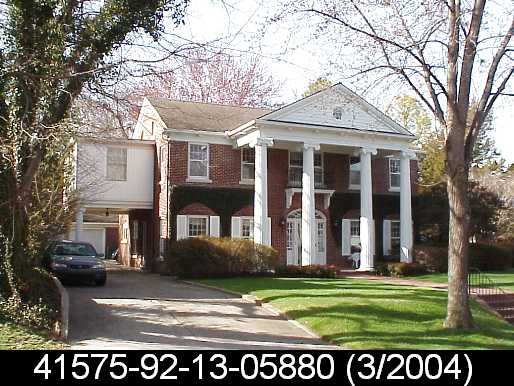
A BatesLine analysis of the 74 names, using voter registration and county assessor records, shows that 67 of them live south of 21st Street in the Money Belt precincts that were recently moved from District 9 to District 4, 4 live north of 21st Street in the district, and 3 don't live in District 4 at all.
Median age of the names on the list is 66. The youngest, former City Councilor Eric Gomez (who threatened to sue his constituents), is 42. Only four of the 74 are under a half-century old.
The median value (as assigned by the Tulsa County Assessor) of the homes where they reside is $392,450, and the median home size is 3,473 sq. ft. Only six people on the list live in homes worth less than $200,000. (The median sales price for Tulsa is $135,000.)
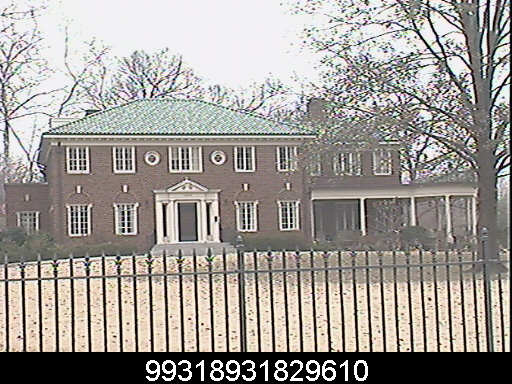
The list of Brune fans includes John Brock, leader of Save Our Tulsa, who believes that City Councilors should be seen and not heard; Joe Westervelt, a developer and former TMAPC chairman who believes citizens should not be heard and historic neighborhoods should not be protected; Frederic Dorwart, the BOK attorney, George Kaiser Family Foundation trustee who pushed through the legally-dubious ballpark assessment scheme; Bob Poe, the highway construction hothead and 2004 Tulsa Metro Chamber chairman, famed for his divisive and embarrassing rants against city councilors and state legislators (Poe was a Democrat as recently as 2009); and Gomez, who decided his constituents didn't need to know about a massive residential facility for the long-term homeless being planned for their neighborhood, then threatened to sue a constituent who complained about it.
What kind of Republican supports Ken Brune? The kind that doesn't want to protect our beautiful older neighborhoods. The kind that wants the council to be a silent rubber stamp. The kind that would rather tear apart the city charter than cooperate and compromise with city councilors who have different priorities. The kind that is well insulated by his wealth from the daily concerns that affect most Tulsans. The kind that wants higher taxes and more corporate welfare. The Cockroach Caucus type of Republican.
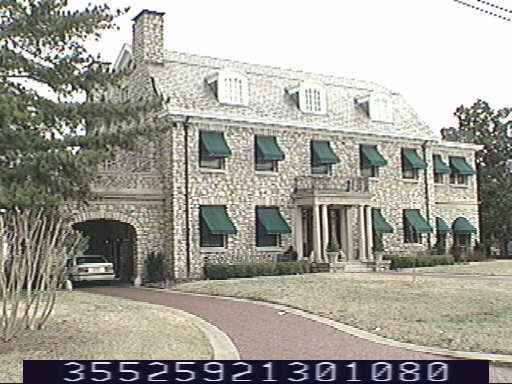
As I wrote about the Cockroach Caucus back before the primary:
A small group of wealthy Tulsans want total control of city government. They don't want thoughtful citizens on the City Council who will ask direct questions or who will stand firm against special-interest manipulation. They want a City Council full of well-trained monkeys who will vote on command. They exist under various names -- TulsaBizPac, Coalition for Responsible Government, Tulsans for Better Government, Save Our Tulsa -- I call them the Cockroach Caucus. They've used unsubstantiated claims of "bickering" and "ward politics" to discredit the councilors we've elected to represent us.These are the people, the Cockroach Caucus, who created a year of turmoil with their 2004-2005 attempt to recall two city councilors over policy differences. For all the whining and complaining they do about "Council bickering," they dragged the city through a divisive year of attacks and smears, all because they didn't like the results of an election, and they refused to work harmoniously with the councilors that the people of Tulsa had elected.
These are the people who led us into the Great Plains Airlines mess. They promised us openly that the taxpayers were at no financial risk, while they were secretly promising financiers that the taxpayers would pick up the tab if their wacky airline idea failed. It failed, state taxpayers coughed up $30 million in transferable tax credits with nothing to show for it, and Tulsa taxpayers got saddled with $7.1 million, which we're paying for with higher property taxes.
These are the Midtown Money Belt people who don't like the councilors that east and west and south and north Tulsa elect to represent our interests at City Hall. Middle-class and working-class Tulsans want more cops on the beat, city pools that open in the summer, streets that don't tear our cars to pieces, zoning that protects our neighborhoods against shoddy redevelopment, and economic policies that attract and keep growing businesses. The Midtown Money Belt types want taxpayers to subsidize their entertainment -- islands in the river, expensive concerts at the arena, WNBA. They want us to subsidize the success of their investments in suburban real estate, at the expense of growth within the city limits to help fund public safety and infrastructure.
So because they don't like the fact that the rest of us elect councilors focused on efficient basic city services, these people propose charter changes to dilute geographical representation on the City Council. They yearn for the days when you could drive a golf ball from the Mayor's midtown backyard into the yards of the other city commissioners. They want to pack the council with at-large councilors who have to be wealthy enough to afford a city-wide race or beholden to those who are.
That's the kind of Republican that backs Ken Brune.
The Brune mailer makes a preposterous claim: "Partisan politics have hampered real progress for our great city." I can't think of a single example of national party affiliation being relevant to a major city government dispute. The divisions that have hurt us are those caused by the rich, old Money Belt coots of both parties who won't work cooperatively with the rest of the city.
When I was the Republican nominee for District 4 City Council, my opponent put out a robocall the day before the election. It was Scott Petty (also on Brune's list as Robert S. Petty), speaking on behalf of "Republicans for Tom Baker."
It was the same bunch then as now. They don't want a bright, independent, creative, and courageous man like Republican Blake Ewing on the City Council. They want a submissive milquetoast like Democrat Ken Brune.
This conservative Republican is proud to support my fellow Republican Blake Ewing for District 4 City Council.
Red-white-and-blue RINO logo courtesy the conservative blog with the tongue-in-cheek name AngryWhiteDude.com
Tonight the Tulsa City Council will vote on whether to annex a 300-foot fenceline running along the west side of the future alignment of the Gilcrease Expressway, parallel to 57th West Avenue. Other parcels within that fenceline belonging to owners who want their property in the city limits will be included in tonight's vote.
The proposal has been described as affecting Berryhill, but it runs to the east of the unincorporated community surrounding Berryhill schools, which would remain unclaimed territory between Sand Springs and Tulsa's fencelines. There's no threat here to the Berryhill community's semi-rural lifestyle. Berryhill would still be outside Tulsa's fenceline, any annexation move would require residents to vote their approval, and they would still have option, should they choose, to be taken into Sand Springs instead.
This is an important strategic move for Tulsa. City of Tulsa tax dollars are building the Gilcrease Expressway, and we need to make sure that future development along that expressway returns money to the city's coffers, rather than funding Sand Springs or Sapulpa. Tulsa fell asleep at the switch a few years ago, and Sapulpa reached an arm into Tulsa County to claim all the development on I-44 leading to the Turner Turnpike. We can't afford to have that sort of thing happen again.
Here's a map with the proposed parcels to be annexed in yellow, extracted from the City Council backup packet. I added annotations marking Berryhill Schools, certain subdivisions, and Chandler Park. Click the image for a full-size view.
